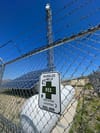The Border Chronicle Weekly Roundup: February 6
Just abolishing ICE misses the bigger point, and a deep look at the history of cotton in the borderlands.
Will the mass slaughter in Gaza result in more profitable surveillance and weapons on U.S. borders? Sure looks like it, says the Australian author.

Independent news, culture and context from the U.S.-Mexico border.